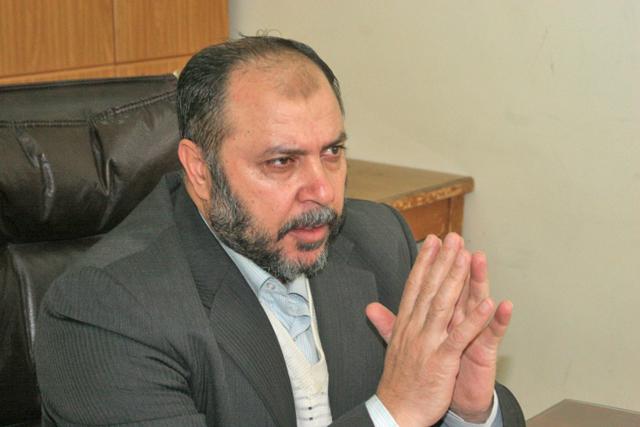You are here
Debate over arrest of Brotherhood leader continues
By Mohammad Ghazal - Nov 23,2014 - Last updated at Nov 23,2014
AMMAN — Opinion leaders on Sunday voiced mixed reactions over the arrest of Muslim Brotherhood Deputy Overall Leader Zaki Bani Rsheid with some calling for state-Brotherhood dialogue and others blaming the movement for the escalation and urging enforcement of the law on all.
Some columnists defended freedom of speech, but said Bani Rsheid’s statements against the UAE were not a political opinion but rather an insult and slander, with one saying the arrest is “merely meant to send a message” to the movement not to cross the red line.
“Zaki Bani Rsheid’s political affiliation does not place him above law and his status in the Muslim Brotherhood does not guarantee him a licence to insult others at the expense of national interests,” Ayman Safadi said in his column in Al Ghad daily Sunday.
Bani Rsheid was arrested at the Brotherhood’s Amman headquarters late Thursday for a post on his Facebook page which prosecutors deemed harmful to the country’s ties with a state bound by diplomatic relations with Jordan.
Bani Rsheid criticised the UAE for adding the Brotherhood to its list of terror groups, following a crackdown on the movement and its supporters.
In his post, Rsheid accused the UAE of supporting terrorism and questioned the legitimacy of its leaders. He called for expelling the UAE from the Arab League and accused it of standing behind all sabotage and destruction in the Arab world.
According to Safadi, taking legal action against the Islamist leader was a decision that took the Kingdom’s interests into account, citing the “strong” Jordanian-UAE ties, which are being developed in different spheres.
He noted that there are hundreds of thousands of Jordanians working in the UAE, while Abu Dhabi supports the Kingdom in surviving harsh economic conditions and challenges.
Opinion leaders differed on whether the arrest is merely an enforcement of the law or a pre-planned step.
“The Muslim Brotherhood in Jordan has been engaged in political action although it is licensed as a charity. Its political activism has intensified over the past years and its relationship with the government has reached a crisis; yet the government has not taken any measures against the movement. Therefore, the arrest of Bani Rsheid cannot be considered politically motivated targeting of the Muslim Brotherhood,” Safadi said.
On Saturday, Al Rai columnist Samih Maaytah said it is the Islamist movement that is to blame for the escalation and not the state.
The former media minister noted that the state has given the Brotherhood a chance to embark on self-revision of its policies, but this does not mean it will tolerate individual violations by the group’s members, especially when manifested in the form of “insults against a brotherly Arab state”.
“If there is a crisis now in the Brotherhood-state relationship, it is the Islamists who should take the blame for mistaking the state’s silence as weakness.”
Al Ghad’s Jihad Mansi said the arrest will open a new “hazy chapter in the relationship between the government and the Muslim Brotherhood”.
“The arrest of Bani Rsheid is not a coincidence and the move was taken after thorough study, especially since everyone is aware of the potential escalation following the arrest,” Mansi said in his column on Sunday.
“The government has repeatedly justified the arrest of Bani Rsheid, but his arrest is meant to deliver several messages to the movement that its actions are being watched and that the government will not remain silent over any act that harms Jordan’s ties with Arab and regional allies,” Mansi added.
The government, however, on Saturday dismissed accusations that the arrest was politically motivated.
“Bani Rsheid violated the law and was detained as his statements in the article would sour Jordan’s relations with a friendly country,” Minister of Political and Parliamentary Affairs Khaled Kalaldeh said Saturday.
“At this critical stage, it is the duty of all to start a dialogue that seeks to preserve a strong Jordan,” Mansi said.
In a column in Ad Dustour Saturday, Rheil Gharaibeh said the relationship between the Muslim Brotherhood and the state had been a success for many years, based “on wisdom, flexibility and understanding”.
The two sides always managed to reach a solution and side with national interests. There have been several ups and downs in the relationship between the two sides, but Jordan has always been a safe haven when leaders of the Muslim Brotherhood across the region were chased, arrested and liquidated.
“It is very important for the Muslim Brotherhood in Jordan to understand the importance of keeping away from violence… and denounce all types of extremism,” Gharaibeh said.
It is equally important for the movement to have clear political dialogue and fruitful cooperation with all national parties regardless of their ideological, religious or political orientations, he added.
“Jordan, which enjoys relative stability amidst a turbulent region, deserves… to maintain this stability and enhance its strength. The Muslim Brotherhood needs to renew its political mindset to one that is capable of addressing imbalances,” noted Gharaibeh, a former Brotherhood leader himself.
Related Articles
Jordan’s Muslim Brotherhood spoke out against authorities’ arrest of the movement’s deputy overall leader Zaki Bani Rsheid, calling his jailing a “political stunt”, while officials insisted that the hawkish politician broke the law.
Tens of Muslim Brotherhood members rallied on Saturday in protest against the detention and upcoming trials of some of the movement’s leaders on terrorism charges.
Defence attorneys representing Muslim Brotherhood Deputy Overall Leader Zaki Bani Rsheid have filed a bail request as dozens of lawyers lined up to join his defence team.

















